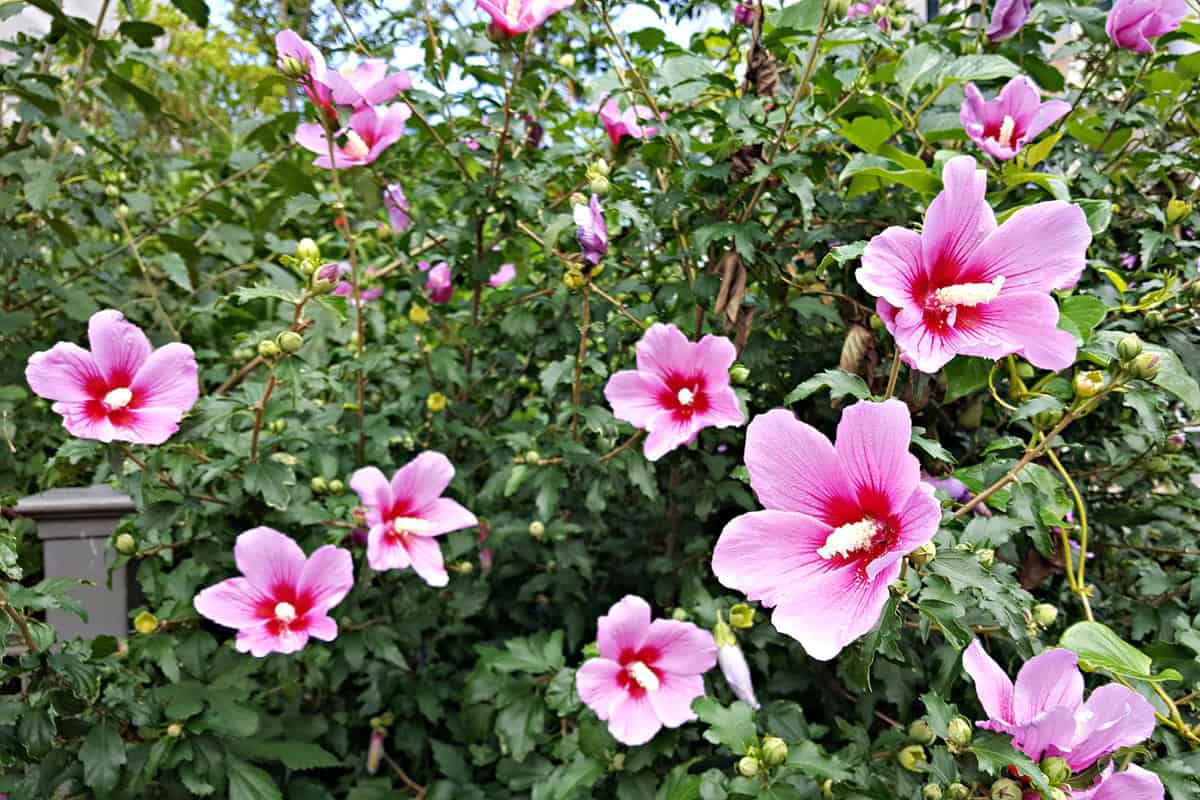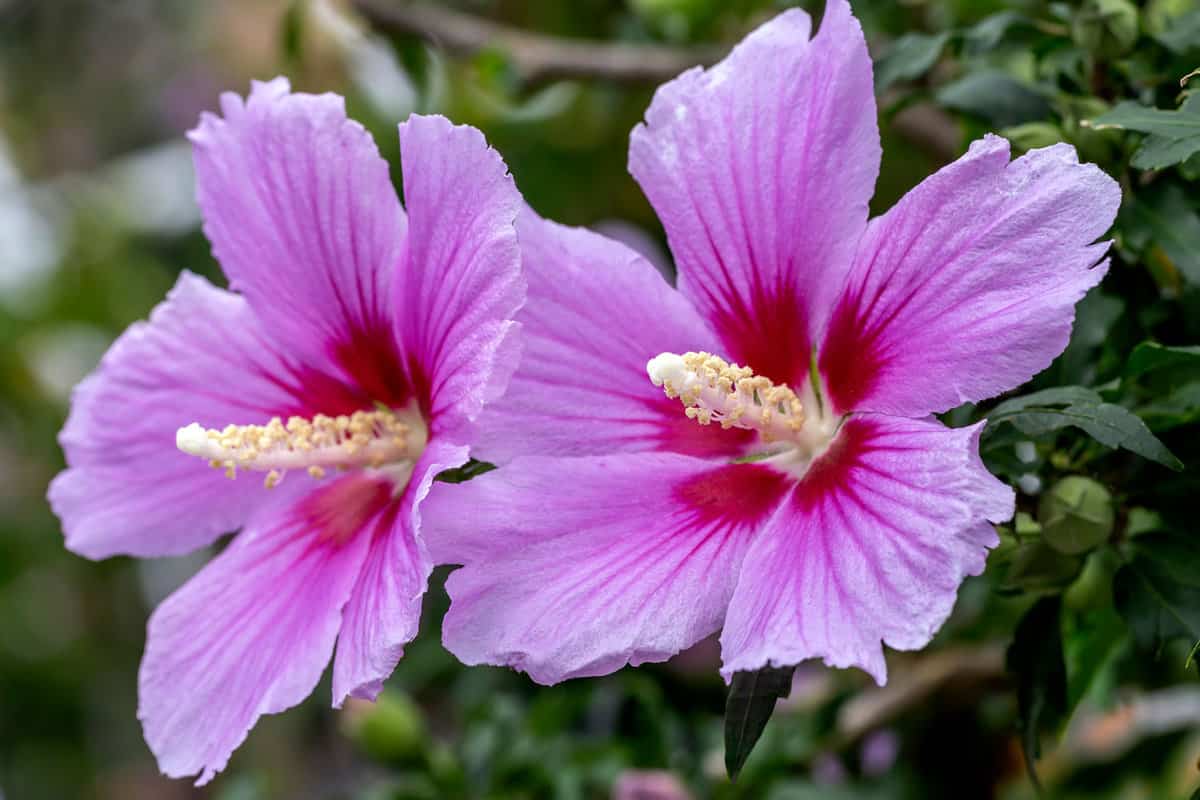If you're considering planting a Rose of Sharon in your garden or yard, you may be wondering if its roots are invasive and if they could cause any damage.
The short answer is yes - the Rose of Sharon has an invasive root system. This tough plant can spread quickly and needs regular pruning to keep it in check.
While the Rose of Sharon is a beautiful shrub that produces lovely flowers, it can also be invasive.

Some states report the species as invasive, and it crowds out more desirable native plants as it naturalizes.
However, if you've planted Rose of Sharon in your backyard, you shouldn't panic. You can easily control this shrub if you are willing to put in the time before new shoots get out of control.
In this article, we'll go over everything you need to know about Rose of Sharon's root system, how to control its growth, and how to keep it from becoming invasive in your garden.
The Rose of Sharon
Rose of Sharon, also known as Hibiscus syriacus, is a deciduous shrub growing up to 12 feet tall and 10 feet wide.
The plant produces showy, hibiscus-like flowers in shades of white, pink, purple, and blue from midsummer to fall.

In addition to its invasive roots, the Rose of Sharon can spread through self-seeding. The plant produces small, brown capsules that contain seeds that can be dispersed by wind or animals.
This can result in the plant popping up in unwanted areas of your garden or yard.
Root System of Rose of Sharon
The root system of a rose of Sharon is known to be deep and extensive, which means that it can be difficult to remove once it's established.
The rose of Sharon has a deep taproot that keeps the shrub firmly in place and makes it difficult to transplant or remove the plant.
The deep and extensive root system of a rose of Sharon can make it difficult to control the plant's growth. The plant can become invasive and take over your garden if left unchecked.
Invasive Nature of Rose of Sharon Roots
Rose of Sharon roots are known to be aggressive and can spread quickly, making it difficult to control their growth.
They can invade other areas of your garden and compete with other plants for nutrients and water. In some cases, they can damage nearby structures such as sidewalks, driveways, and foundations.
It's important to note that not all Rose of Sharon plants are invasive. Some cultivars have been bred to be less aggressive, so if you're interested in planting this shrub, be sure to choose a variety that is known to be less invasive.
Here are some examples of less invasive cultivars of Rose of Sharon that you may consider planting:
- Aphrodite
- Blue Chiffon
- Diana
- Minerva
- Sugar Tip
Impact on Other Plants
Rose of Sharon can significantly impact other plants in your garden. This is because it tends to spread aggressively and can quickly become invasive.
Its roots can compete with other plants for water and nutrients, leading to stunted growth or even death.
Additionally, the large size of the Rose of Sharon plant can create shade that can also impact other plants. This can be especially problematic for sun-loving plants requiring full sunlight.
If you have other plants in your garden, it's important to consider their needs and ensure that the Rose of Sharon is not negatively impacting them.
One way to minimize the impact of Rose of Sharon on other plants is to plant it in a designated area away from other plants.
This can help to contain its growth and prevent it from spreading too far. Alternatively, you can also consider planting it in a container to help control its growth and prevent it from taking over your garden.
If you decide to plant Rose of Sharon in your garden, it's essential to keep an eye on its growth and take action if it becomes invasive.
Preventing Invasive Root Growth
If you want to prevent invasive root growth of your Rose of Sharon plant, you can do a few things. Here are some tips to help you keep your plant under control:
- Plant in the right location: Choose a location suitable for the plant's size and growth habit. Make sure there is enough space for the roots to grow without causing damage to nearby structures or plants.
- Use a root barrier: A root barrier is installed around the plant to prevent the roots from spreading too far. This can be especially useful if you have limited space or want to plant your Rose of Sharon near a sidewalk or other hardscape.
- Regular pruning: Regular pruning can help control your plant's growth. Prune your Rose of Sharon in late winter or early spring to remove dead or diseased wood. You can also prune to shape the plant and keep it from getting too large.
Check out this root barrier on Amazon.
Removal and Control of Invasive Roots
If you want to remove or control the invasive roots of your Rose of Sharon plant, there are several ways to do so. Here are some effective methods:
Digging
One of the most effective ways to control the invasive roots of Rose of Sharon is by digging them up.
You can use a shovel or a spade to dig around the plant and remove the roots. Wear gloves and protective clothing when doing this, as the roots can be sharp and prickly.
Cutting
Another way to control the invasive roots of Rose of Sharon is by cutting them.
You can use pruning shears or loppers to cut the roots growing too far away from the plant. Make sure to sterilize your tools before and after using them to prevent the spread of disease.
Mulching
Mulching is a great way to control the invasive roots of Rose of Sharon. You can use organic mulch, such as wood chips or bark, to cover the soil around the plant.
This will help suppress the roots' growth and prevent them from spreading too far.
Chemicals
If all else fails, you can use chemicals to control the invasive roots of Rose of Sharon. You can use herbicides such as glyphosate to kill the roots.
However, follow the instructions carefully and use protective clothing when using chemicals.
Check out this glyphosate concentrate on Amazon.
Final Words
The Rose of Sharon is a beautiful, low-maintenance shrub that can add color and texture to your garden.
However, it's important to note that some varieties can be invasive and have aggressive root systems.
If you're interested in planting this shrub, be sure to choose a cultivar that is known to be less invasive.
Additionally, regular pruning and maintenance can help keep the plant under control.
With the proper care and attention, the Rose of Sharon can be an excellent addition to any landscape.
For more related articles, read here:
13 Flowering Plants That Bloom All Summer Long: Creating An Endless Summer In Your Garden!


